- Home
- Brian Garfield
Marshal Jeremy Six #6 Page 12
Marshal Jeremy Six #6 Read online
Page 12
He went on toward the hotel, summing up in his mind what he had learned. This afternoon he had made it look like an accident when he had met Marianne and held the hotel door for her. Actually he had seen her go out and had waited for her to return, timing his arrival at the door to coincide with hers. He had struck up a conversation, introducing himself in a vaguely mysterious way and dropping hints that he had known her father during the Civil War.
He had allowed her to draw him out. He had met her father, he admitted to her, under odd circumstances—he dropped a few references to prison camps and field hospitals. When she was plainly on the hook, her interest whetted, he excused himself, saying he had an important appointment. He left the hotel knowing that he had all but convinced Marianne that he, Danziger, was the mysterious Boone who had rescued her father and then disappeared into the night.
He didn’t know any more about her father or the spy Boone than Will Greer had told him, and he didn’t want her to ply him with questions to which he would not know the answers. For that reason he had left her to convince herself. She’d had all afternoon to piece together the hints Danziger had dropped. By now, if she was as smart as she seemed, she’d have talked herself into the absolute conviction that Danziger couldn’t possibly be anyone but the secret agent Jim Boone.
A gambler always had to be something of a confidence man; the professional gambler had to have the ability to perform mental sleight of hand, convincing others that lies were true and truth was a lie. The gambler’s profession depended on expert deception and no gambler survived long on the circuit without developing that ability to a peak.
He had lost a lot of self-confidence, he knew, but he hadn’t lost the con-man’s abilities. He was reasonably sure that Marianne had taken the bait. And if he had sized her up correctly, she wouldn’t need further evidence; she would jump right past the stage of suspicion into the stage of excited discovery and gratitude.
At least, that was what he was hoping for. It was time to see if it had worked. He straightened his lapels and turned into the hotel.
She was on the divan, knitting. When she looked up her face brightened with a warm smile. It was enough to tell him he’d been right. She wouldn’t be sitting in the hotel waiting for him if she hadn’t made up her mind.
He swept off his hat with a gallant Southern gentleman’s gesture and made a brief bow. “Ma’am,” he said softly, in his best New Orleans drawl. He tried to make his deep-sunk eyes smile out of his gaunted face.
She stood up and took both of his hands in hers. “Mr. Danziger, there’s something I must say to you.”
“I thought there might be,” he murmured, “but I think I’d better explain one thing to you first.”
She began to speak, full of excitement that flushed her cheeks, but Danziger shook his head. “Let me finish. You’re an Army girl, Miss Holbrook, and perhaps you know the provisions of the War Department Act of ’Sixty-six?”
It made her frown; obviously she had not expected this sort of direction in conversation. Danziger curled the brim of his hat, held it at his side, and spoke in a soft confidential way.
“Some of the provisions of that Act are well known in Army circles. For instance, former Confederate officers may serve in the United States Army but they cannot hold commissions. That’s why you find sergeants in the Cavalry who were majors and even generals in the Confederate Army.”
“Yes,” she said, “I do recall that, but I don’t see—”
“You will, I think,” he cut in. “There’s another provision of the Act that isn’t so well known. It provides that the armistice of ’Sixty-five, and the general amnesty to Rebel soldiers, does not apply to spies and secret agents still at large. Especially not to double agents.”
“Double agents?” she said, puzzled.
He explained: “That would be a spy who served both sides.”
“How could a man do that?”
“He might pretend to be serving the Confederate cause while actually being a Union Agent. Or vice versa.”
She said slowly, “I think I’m beginning to understand.”
“It might be,” he murmured, “that a former Confederate double agent who was still at large would still be under sentence of death from the military tribunal, if his identity were discovered. You understand my meaning, Miss Holbrook?” He spoke in a very courteous way, as if he were willingly putting his life into her hands.
She said, “What you’re saying is that if the Army learned your real identity they could still hang you for things you did during the war. Why, that seems—”
“No one said anything about me, Miss Holbrook. I was speaking in general terms. I wouldn’t want you to get the wrong idea.” He smiled, like a fellow conspirator.
Her frown turned to a small laugh. “Yes, I do see, Mr. Danziger.”
“Then you see why there might be certain things I’d rather not discuss with you.”
“Of course.” She reached out and squeezed his hand. “Of course I do. There might be many things you’d like to tell me but you can’t.”
“Exactly.” He stood up straight and glanced toward the hotel dining room. “Tell me, have you had dinner?”
“No,” she said, and hesitated. “Not yet.”
“Would you care to join me?”
She smiled and linked her arm in his.
On his way into the dining room, with Marianne on his arm, Danziger congratulated himself privately. It was a bluff, but it had worked; actually he had no idea whether any such statute existed, and the only provision of the War Department Act of 1866 that he really knew was the one he had mentioned about the former Confederate officer’s ineligibility for a commission in the U. S. Army. That was fairly common knowledge along the frontier, where many Southerners served in the Indian fighting Cavalry. He didn’t know a thing about spies or agents beyond what he had read in the illustrated weeklies. But he’d had to dream up something that would dissuade the girl from asking questions or coming right out and addressing him as Mr. Boone.
He gave her hand a friendly pat before she disengaged his arm to sit down; he held her chair for her and went around to sit. She said, “My guardian may come to dinner soon.”
“I doubt it. I saw him in the Drover’s Rest up to his eyebrows in a card game. He looked as if he’d put down roots.” He smiled.
She nodded, a bit troubled. “Yes, he’s like that—he has a compulsion about gambling and it’s not good for him, because he’s not a good card player.”
The compulsive ones never are, he thought. What he said was, “Well, your guardian seems to be a fairly successful man. He can afford to indulge in a friendly game now and then.”
“Sometimes they’re not so friendly,” she said. “I’ve seen him lose quite a lot of money.”
“How long has he been your guardian?”
“Since my father died—about four years ago—no, it’s almost five years now. I didn’t—”
“I know,” he said. “I heard about his death at the time.” He gave her a friendly little smile. “I followed the news of your father’s career. He was a fine officer. I was sorry to learn of his death. I suppose sometimes, in strange ways, a man develops a proprietary sort of feeling about another man.”
“For example, when he saves the man’s life,” she said quickly.
“Could be,” he said carefully, and shot her a warning glance of secrecy. Her excitement was all but breathless; there was no doubt in her mind that he was the savior who had rescued her father. She was a bright, quick-witted girl, but she was the sort who wouldn’t have much trouble converting the middle-aged, gaunt ex-gunfighter she saw before her into the image of an Arthurian knight on a white horse, somehow appearing as if by magic to enter her life with a smile and a flourish.
It was the image he had calculated to create, but now that she was falling for it he was beginning to have his regrets. Angry with himself, Danziger took time out to compose himself by reading the menu and making small talk about frontie
r towns and their food; he drew richly on his New Orleans boyhood in describing the culinary delights of the old French city, its plush restaurants and gourmet chefs.
He asked her about her guardian, McQuarter the cattle buyer; he asked her questions without appearing to interrogate her. By the end of the meal he knew what he had come to learn: under the terms of her father’s will, she was to inherit the Holbrook estate on the day she reached the age of twenty-five. Sunday. The Holbrook estate was not enormous but it was comfortable. The figure Marianne tossed off was “about seventy thousand dollars.” And it came as no great surprise to Danziger to learn that if the girl should die before her twenty-fifth birthday, the estate would go to her guardian, Owen McQuarter, who had been acting as executor ever since her father’s death.
It didn’t take any great mind to figure out what had happened. McQuarter had probably gambled away a good part of the estate and knew that as soon as the girl came of age he would have to make an accounting. On the other hand, if the girl died, McQuarter would not have to account to anyone, and he would be entitled to keep whatever was left of the $70,000. Obviously he had hired Hanratty as a go-between to arrange the murder of Marianne Holbrook.
The thought of Hanratty struck an involuntary chill through Danziger; he felt it ripple its way up his spine. He had to look away from the girl, and, as if by supernatural ordination, his eyes slipped across the dining room window. Outside, in the half-shadow, he could see a face peering inside.
It was Eddie Hanratty. Hanratty was scowling meaningfully at him and there was no mistaking what Hanratty had in mind.
Danziger shook his head almost imperceptibly and turned his attention back to the girl; he tried to smile.
“What’s wrong?” she said, gentle but startled. His expression seemed to frighten her.
He tried to laugh it off but she pressed him. “There is something wrong. Tell me.”
He knew he had to tell her something. He looked down at his plate and sawed through a bit of steak while he composed his answer. Finally he said, “It’s no good, I guess. I shouldn’t have made myself known to you. It was an impulse and I’m sorry I’ve done it. It will never do you any good, knowing a man like me.”
“I like you fine,” she said softly. She was a solid sort of girl; she had sand. He had pulled the wool over her eyes but she was no fool. She said, “You’re a gunman. That’s the way you make your living, isn’t it?”
He looked up, surprised. She said, “It’s no secret around town. Everyone knows who you are. We received some unfriendly looks when we came in here together—did you think I hadn’t recognized them? I know what I’m doing. You don’t have to treat me like a fragile piece of glass, I’m not a little girl any longer.”
He said something that surprised him by its honesty: “Do you know what it feels like to kill a man, Miss Holbrook? To watch him spit blood in some dusty street?”
“If you’re trying to disgust me you won’t succeed. I’ve seen what the Apaches do to people on wagon trains. I’m not a shy violet, Mr. Danziger.”
“Then maybe you’ve got a mistaken notion of what a professional gunfighter is.”
“I don’t think so,” she answered evenly.
“Sure,” he muttered, as much to himself as to her, “a gun makes a man feel big. But they’ll buy drinks for the man who shoots you down, and they’ll spit on your grave. My grave, Miss.” He looked up suddenly, to catch her expression, then went on. “Gunfighters are not glorious, gallant knights, Miss. Let me tell you how glory tastes when you’re hungry. How it feels to have nothing close to you but your shirt. To feel like you’ve got knives sticking in you because you suddenly wake up one morning and realize that you made the terrible mistake of believing a gun was the answer to every problem that turned up. A gunfighter is only half a man, Miss Holbrook. A gunfighter’s no good. He can’t live with anybody but himself, and sooner or later the time comes when he can’t even do that. The day you take up a gun you marry that gun, and you raise its children. You’re husband and father to that gun and the killings it does in your hand.”
She studied him calmly and said, “I’m unarmed, Mr. Danziger. You needn’t fire all your ammunition at me.”
“I’m sorry,” he said. “I guess it spilled out.” That was true; he hadn’t meant to say all that.
He gave her a twisted smile and added, “If this gun of mine could talk it would have quite a bit to say.”
She was toying with the spoon in her saucer. Steam curled up from the after-dinner coffee. She said in a faraway voice, “Self-pity isn’t unique. You don’t have a corner on it. I’ve lived with it for enough years to know that.”
“You?”
She met his eyes. “I always wanted to be beautiful. I knew I wasn’t but that didn’t stop me from wanting it. Sometimes when I’m not thinking about it I make up lies to convince myself that I’m a beautiful woman—wanted, desired, loved. Yesterday I told the marshal I’d been married. I told him my husband was killed at Wounded Knee. It’s a story I often tell strangers—if you’d caught me in a different mood I’d have told you the same thing, but it isn’t true. I’ve never been married. No one ever asked me.”
She was looking at the coffee spoon, her eyes downcast. “I’m a very plain girl. Sometimes I’m able to accept that. I have to, whenever I pass a mirror, you know. I think I’m better about it than I used to be.” She looked up at him. “So don’t think you’re the only one who’s sorry for himself, Mr. Danziger. And don’t mistake me for a flighty girl painting imaginary pictures on the sky.”
“You’re mistaken about yourself,” Danziger said. “You’re a damned attractive girl.”
A sour little smile jerked at one corner of her mouth. “Thank you,” she said, not meaning it, not believing him.
Without saying anything, he stared at her until her eyes came up and met his. He held her glance until she blushed. He said, “You’re a lot of woman, Marianne. You’ve got a wonderful smile. Start believing in yourself.”
“Are you saying that to me—or to yourself?”
It took him aback; she had trapped him neatly. She said, “For a moment there you were feeling sorry for me. Do you still feel sorry for me?”
“In a way.”
“Don’t. Every word I told you was a lie. I was married—you can look it up in Army records. My husband was killed at Wounded Knee just as I said he was. He was a good man and I loved him but I won’t spend the rest of my life weeping for him. And now what about you, Mr. Danziger?”
“This town,” he answered petulantly, “is just full up to the brim with crusading evangelists who want to bring me back to the path of the self-respecting and the righteous.”
“Who do you mean by that?”
“Your friend, the marshal,” he answered.
“I hardly know him.”
He nodded. “But I know him. We used to be close friends, Jeremy Six and I.”
“Used to be?”
“I’m nobody’s friend now, Miss. No good to anyone. Everything I touch—it dies. I reckon I was born to be hung, and that’s the sum of it.”
“Nonsense,” she said, in the book-closing definite way of a practical girl. “All you need to do is occupy yourself with a challenge, something to get your mind off your troubles.”
It made him laugh. “Thank you. But things aren’t as simple as you’d like to have them.”
“Then what are the complications?” she demanded. “Mr. Danziger, Boone, whatever your name is, look at me. A moment ago I had you all ready to take me in your arms and pat me on the head and say, ‘There, there, little girl, everything will be all right—you’re not really a wallflower at all, you’re the most beautiful girl in the world, so stop feeling sorry for yourself.’ You were all ready to come to my rescue, Mr. Danziger, just like the shining white knight you claim you aren’t.”
He sat back and lifted the coffee cup, drained it and watched her over the rim of the cup. When he put it down he said gently, “You’re a
lot of woman.”
“You already said that.”
“I meant it.”
She reached across the table to touch his hand, but he drew it back and said bitterly, “Marianne, I’m not fit to hold your stirrup.”
“Nonsense.”
“Take my word for it. There are things about me you don’t know—or want to know.”
“I’m strong,” she said. “Let me be the judge.”
“I can’t do that.”
“Try.”
“Why?” he asked. “Why should it matter to you?”
“Can’t you believe I could care enough, without needing some other motive?”
“Aagh,” he grunted, dismissing it. “We’re answering questions with more questions.”
A silence stretched between them until she said, in a different tone, “What’s going to happen now?”
“What do you want to happen? Do you know?”
“I’m not sure,” she said. “Do you know?”
“No,” he said. “Yes. I know what’s going to happen to me, anyway. There’s nothing waiting for me but a grave.”
“I guess,” she murmured, “that doesn’t make any difference in the way I might feel.”
It made him glance at her quickly. He said, “You’re a strange one. You’ve got a lot of sand—you’re pretty deep.”
“So are you,” she said. “I don’t bother myself with shallow men.”
He stood up. It had gone far enough; he needed to be alone to sort things out. He said, “It would be a mistake for you to bother yourself with me, then.”
“I don’t think so,” she answered. “Good night—Cort.”
Her eyes were lifted toward his, direct and unwavering. He left the dining room disturbed by the frankness of her gaze. He turned up the stairs and went to his room, locked the door and only gave a passing glance to the bottle of whisky on the commode; he sat down and had to hitch his gun around for comfort. On the rickety table before him sat a pack of playing cards, squared off and neat. He began to lay out a solitaire game: it was a time to make decisions.

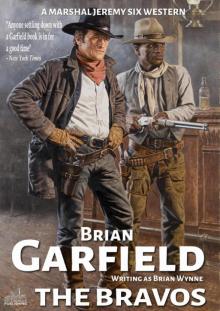 Marshal Jeremy Six #3
Marshal Jeremy Six #3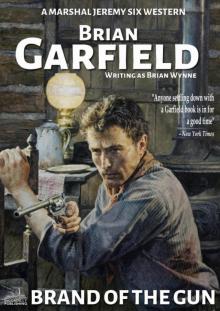 Marshal Jeremy Six #6
Marshal Jeremy Six #6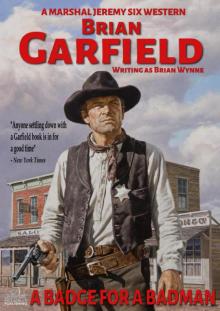 Marshal Jeremy Six #5
Marshal Jeremy Six #5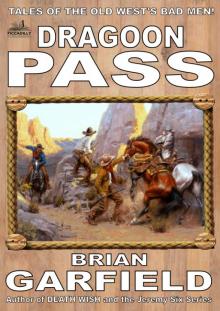 The Outlaws 2
The Outlaws 2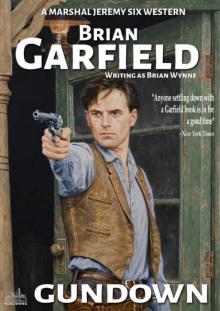 Marshal Jeremy Six #7
Marshal Jeremy Six #7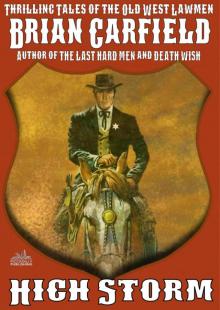 The Lawbringers 4
The Lawbringers 4 Marshal Jeremy Six #4 the Proud Riders
Marshal Jeremy Six #4 the Proud Riders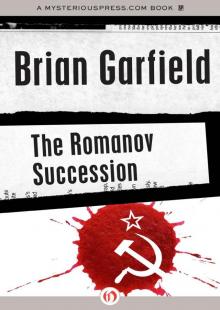 The Romanov succession
The Romanov succession Marshal Jeremy Six #8
Marshal Jeremy Six #8 Sliphammer
Sliphammer Line of Succession
Line of Succession Deep Cover
Deep Cover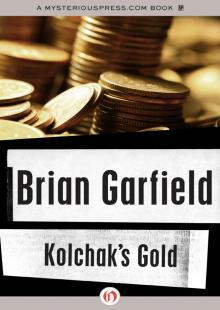 Kolchak's Gold
Kolchak's Gold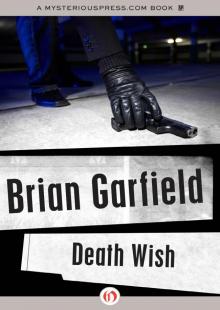 Death Wish
Death Wish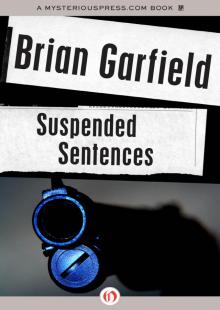 Suspended Sentences
Suspended Sentences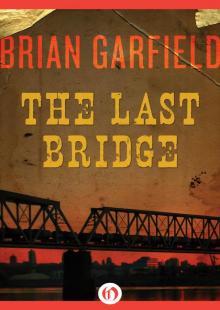 The Last Bridge
The Last Bridge Relentless
Relentless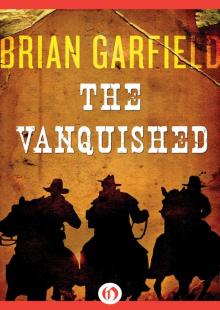 The Vanquished
The Vanquished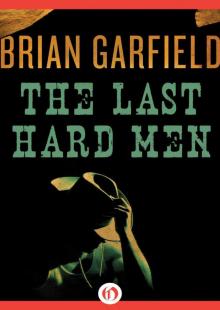 The Last Hard Men
The Last Hard Men Hit and The Marksman
Hit and The Marksman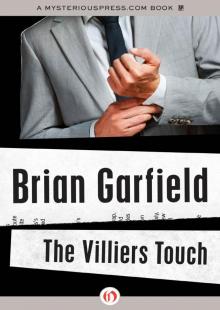 Villiers Touch
Villiers Touch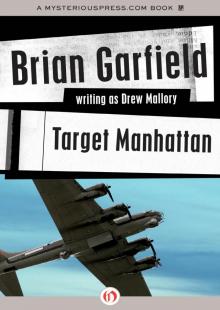 Target Manhattan
Target Manhattan Marchand Woman
Marchand Woman What of Terry Conniston?
What of Terry Conniston?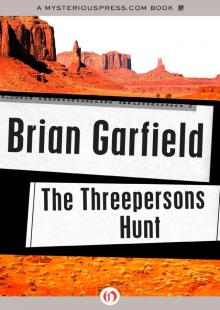 Threepersons Hunt
Threepersons Hunt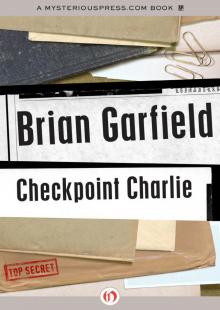 Checkpoint Charlie
Checkpoint Charlie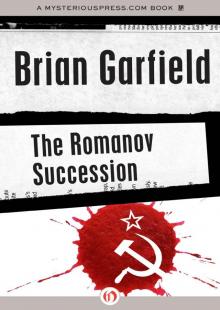 Romanov Succession
Romanov Succession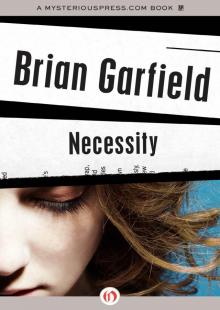 Necessity
Necessity Death Sentence
Death Sentence Fear in a Handful of Dust
Fear in a Handful of Dust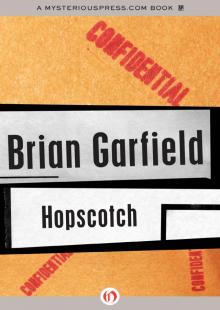 Hopscotch
Hopscotch